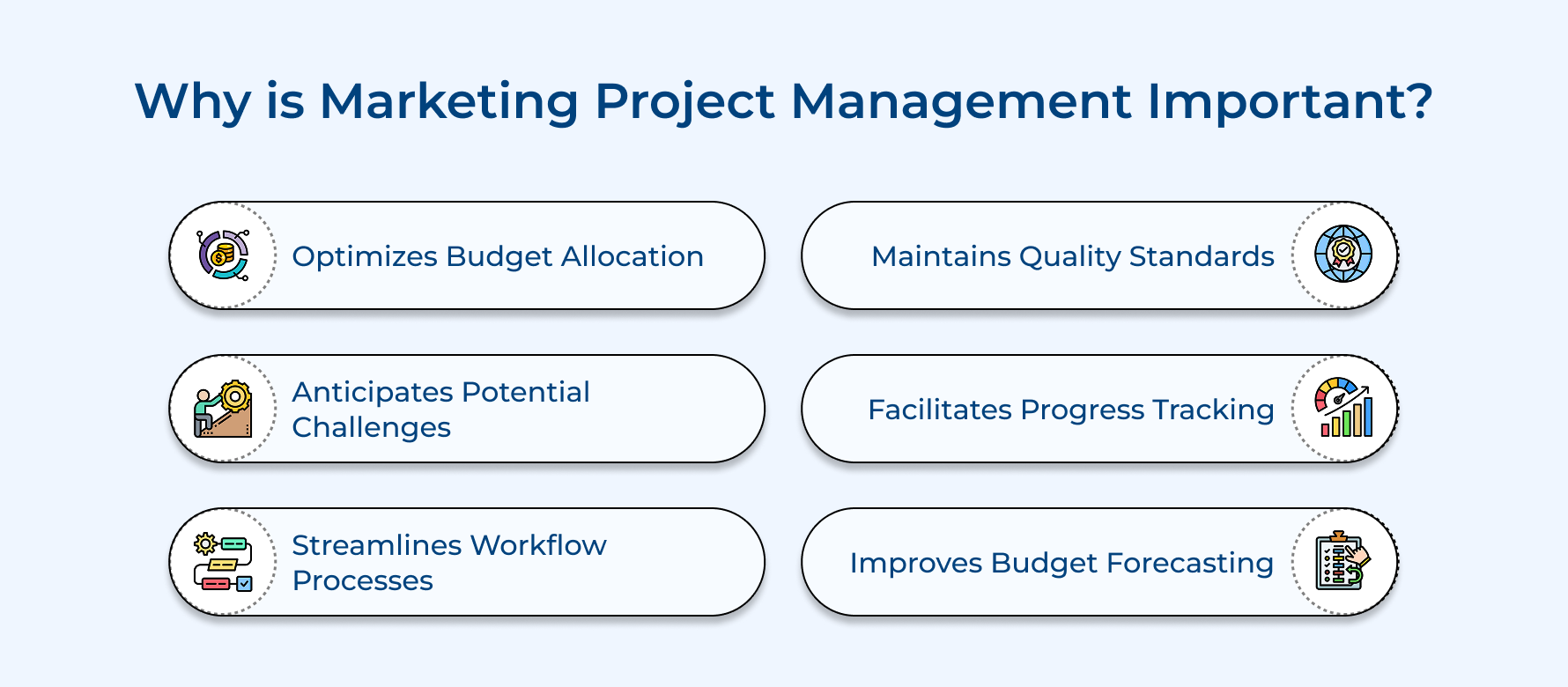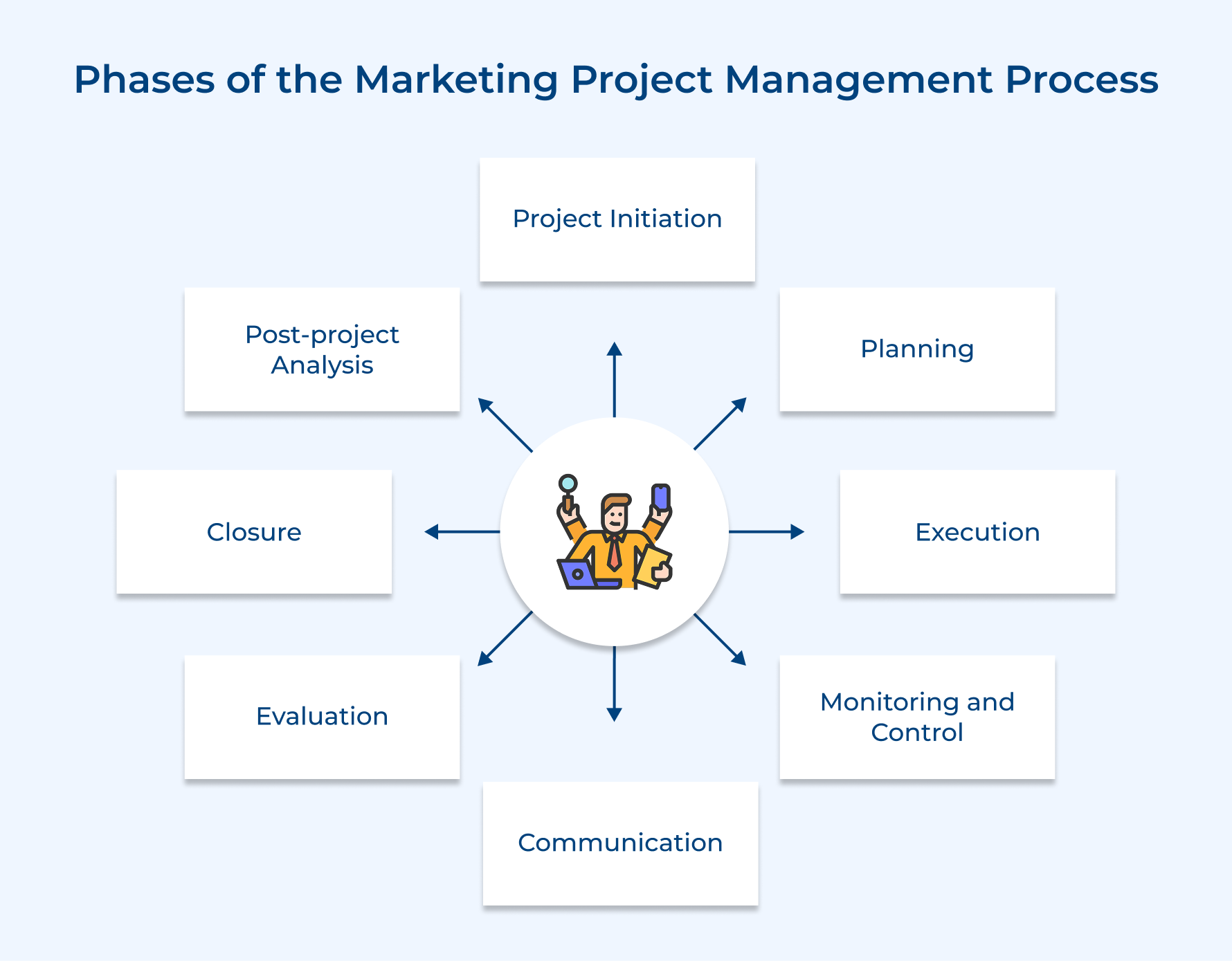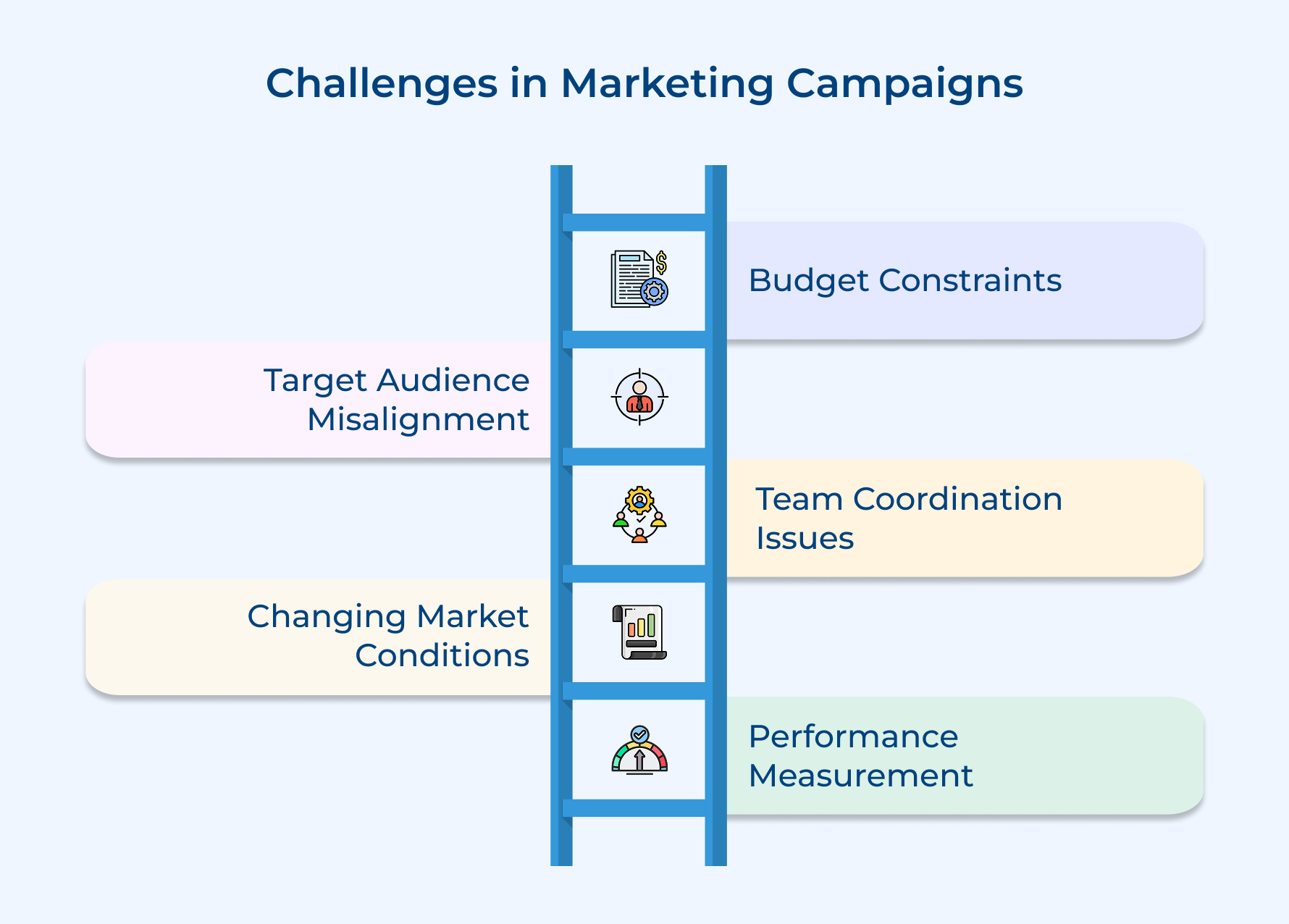Ultimate Guide to Marketing Project Management: Phases & Tools
- What is Marketing Project Management?
- Why is Marketing Project Management Important?
- Phases of the Marketing Project Management Process
- Essential Tools for Marketing Project Managers
- Key Project Management Skills for Marketing Teams
- Common Challenges in Marketing Campaigns
- Key Takeaways for Future Marketing Initiatives
- FAQs about Marketing Project Management

Key Highlights:
- Marketing project management helps streamline workflows with effective project management tools and practices.
- Optimize resources for on-time, high-quality marketing campaign delivery.
- Enhance team collaboration and communication for seamless execution.
Managing marketing projects can feel like juggling a dozen balls at once. Tight deadlines, constant communication, and keeping everyone on the same page—it’s no small feat.
Without a solid plan, things can quickly spiral into chaos, leading to missed deadlines, budget overruns, and frustrated teams.
But it doesn’t have to be that way!
With effective marketing project management, you can streamline workflows, boost team collaboration, and deliver campaigns that hit the mark every time.
Let us explore how smart planning and the right tools can help you keep projects on track while driving impactful results.
What is Marketing Project Management?
Marketing Project Management is the systematic process of planning, and executing while monitoring marketing initiatives using project management principles as well as methodologies. It involves coordinating various marketing activities, resources, timelines, and team members to achieve specific marketing objectives while staying within budget as well as timeline constraints.
Effective project management helps organizations allocate resources wisely, minimize risks, and optimize the use of time or budgets. By implementing MPM, teams can improve communication, ensure accountability, and drive successful outcomes that enhance brand visibility as well as customer engagement.
Key objectives:
- Maximize resource efficiency by optimizing the allocation of time, budget, and human resources across marketing initiatives.
- Ensure timely delivery of marketing deliverables while maintaining quality standards and brand consistency.
- Facilitate effective communication and collaboration among all stakeholders involved in marketing projects.
- Track and measure marketing project performance to demonstrate ROI as well as identify areas for improvement.
Why is Marketing Project Management Important?
Marketing project management isn’t just about finishing projects on time. It ensures your campaigns are organized, on budget, and on time! Let’s explore a few more reasons to consider.
- Optimizes Budget Allocation
Marketing project management helps you make the most of your budget. By efficiently distributing financial resources across client projects, it ensures you’re not overspending while still maximizing the ROI for every campaign.
- Anticipates Potential Challenges
Nobody likes surprises that derail a project. Good project management helps you spot potential roadblocks early, so you can plan and keep things running smoothly. The proactive approach keeps clients happy and projects on track.
- Streamlines Workflow Processes
Juggling multiple client projects? Established workflows and clear processes are lifesavers. They help your team stay focused, eliminate confusion, and ensure everyone knows their role at every stage of the project.
- Maintains Quality Standards
Consistency is key to building trust. Effective project management enforces quality standards through regular reviews and checks, ensuring your deliverables meet or exceed client expectations every time.
- Facilitates Progress Tracking
With a systematic approach to tracking, you can easily monitor milestones, deadlines, and deliverables. It keeps everyone informed, from your team to your clients and allows for quick adjustments when needed.
- Improves Budget Forecasting
Ever wish you had a crystal ball for planning? Strong project management gives you the next best thing—accurate budget forecasting. By using past data and current performance, you can make precise estimates for future projects, strengthening client relationships as well as profitability.
Phases of the Marketing Project Management Process
The marketing project management process is all about turning ideas into successful campaigns. Let’s break them down into smaller sections and learn how to make them more efficient.
1. Project Initiation: Define Project Goals
Starting your project on the right foot is crucial. Here’s how you can set a solid foundation:
Define Clear Goals
- Set SMART goals (Specific, Measurable, Achievable, Relevant, Time-bound) to give your project direction.
- Ensure goals are well-documented and approved by key decision-makers.
Involve Stakeholders
- Host a kickoff meeting to align everyone on the project’s objectives.
- Encourage input from all stakeholders to prevent misalignment down the road.
Establish the Project Charter
- Clearly outline objectives, scope, and success metrics.
- Define roles and responsibilities for each stakeholder to ensure accountability.
Focusing on these steps will help you prevent confusion, avoid scope creep, and set the stage for a smooth as well as successful project.
2. Planning: Create Detailed Plan
For a product campaign, planning means outlining tasks like creating content, scheduling promotions, and finalizing designs.
Break the project into smaller tasks using a Work Breakdown Structure (e.g., “Create assets” becomes “Design banners” and “Write ad copy”) to ensure nothing is missed.
Use tools like Gantt charts to map timelines, assign responsibilities, and establish task dependencies.
Add buffer time for unexpected delays and set milestones to track progress. With a strong plan, you’ll minimize risks, optimize resources, and keep the project on track.
3. Execution: Implement Marketing Strategies
Execution is where all your planning turns into action and results. It’s about making sure resources are used effectively, timelines are followed, and deliverables meet expectations without compromising on quality.
Stick to your marketing strategies, keep the team coordinated, and manage resources smartly to stay on track.
Regularly check progress, tackle any issues promptly, and ensure everything delivered meets the standards you set.
Actionable Tips
- Use project management software to track task completion and team collaboration in real time.
- Hold regular brief team meetings to discuss progress, challenges, and necessary adjustments to the execution plan.
4. Monitoring and Control: Track Progress Regularly
Monitoring ensures projects,
- stay on track.
- identifies potential issues early.
- allows for timely corrective actions.
It helps maintain project quality, timeline adherence, and budget control throughout the execution phase.
Implement tracking systems to monitor key metrics, review progress against milestones, and assess resource utilization.
Use dashboards and regular reports to maintain visibility into project status.
5. Communication: Update Stakeholders Consistently
Effective communication keeps all stakeholders informed, aligned, and engaged. It prevents misunderstandings, maintains transparency, and ensures everyone understands their roles as well as project progress.
Establish regular communication channels and reporting schedules. Use various communication tools to share updates, gather feedback, and maintain stakeholder engagement throughout the project lifecycle.
Actionable Tip: Create a communication plan that outlines the frequency, channels, and format of updates for different stakeholder groups.
6. Evaluation: Assess Outcomes Thoroughly
Evaluation helps determine if project goals were met, identifies areas of success as well as improvement, and provides insights for future projects.
Compare actual results against initial goals, analyze performance metrics, and gather feedback from stakeholders.
Document lessons learned and identify best practices for future projects.
Create a comprehensive evaluation report comparing actual results with initial objectives using concrete metrics.
7. Closure: Finalize and Document
Proper closure is key to finishing strong and transitioning smoothly. Here’s how to ensure nothing is left undone:
Complete Final Deliverables
- Ensure all project deliverables are finalized and meet quality standards.
- Obtain formal sign-offs from stakeholders to confirm completion.
Release Resources
- Free up team members from project responsibilities and allocate them to new tasks.
- Close out any external vendor contracts or resource agreements.
Organize Documentation
- Archive all project documents in one centralized location for easy access later.
- Share key insights and lessons learned for future projects.
Use a project closure checklist to confirm every step is complete. Make sure all loose ends are tied up before declaring the project officially closed.
8. Post-project Analysis
Post-project analysis provides valuable insights for future projects, helps identify areas for improvement, and contributes to organizational learning. It helps refine processes and strategies for better results.
Conduct detailed analysis of project performance, document lessons learned, and create recommendations for future projects. Share insights with relevant stakeholders for organizational improvement.
Schedule a lessons-learned session with the project team to capture insights while they’re still fresh. Create an action plan based on analysis findings to implement improvements in future projects.
Essential Tools for Marketing Project Managers
Having the right tools can make all the difference for marketing project managers. From planning and collaboration to tracking progress, these tools list will help you stay organized.
Project Management Software
Project management software provides a centralized platform for task management, team collaboration, and project tracking. It eliminates communication gaps, reduces confusion, and helps teams stay organized while managing multiple marketing initiatives simultaneously.
Teams can create project timelines, assign tasks, track progress, share files, etc. They can also communicate through features like Gantt charts, Kanban boards, and team chat. Popular tools include Asana, Trello, and Monday.com for comprehensive project oversight.
Time Tracking Tools
Time tracking tools help managers understand resource allocation, monitor team productivity, and ensure projects stay within scheduled timelines. They provide valuable insights for future project planning as well as resource management.
Managers can track hours spent on different tasks, monitor team workload, generate timesheet reports, and analyze time distribution across projects. Tools like Toggl and Harvest enable accurate time management along with productivity analysis.
Budget Management
Budget management tools ensure marketing expenses stay within allocated limits. They help track spending, forecast future costs, and maintain financial accountability across all marketing initiatives as well as campaigns.
Managers can create budgets, track expenses, monitor campaign costs, generate financial reports, and analyze ROI. Tools like QuickBooks or specialized marketing budget software provide comprehensive financial oversight.
Project Planning Tools
Planning tools help visualize project timelines and create structured workflows. They enable efficient resource allocation and help maintain clear project roadmaps for all team members.
Teams can create detailed project schedules, set milestones, manage dependencies, and plan resources. Tools like Microsoft Project or SmartSheet allow comprehensive project planning and timeline management.
Email Marketing Platforms
Email platforms streamline campaign management, automate communication sequences, and track engagement metrics. They ensure consistent communication with stakeholders and target audiences throughout project lifecycles.
Managers can create email campaigns, schedule communications, segment audiences, and track performance metrics. Platforms like Mailchimp or HubSpot provide comprehensive email marketing and automation capabilities.
Reporting Dashboards
Reporting dashboards provide real-time visibility into project performance, campaign metrics, and team progress. They enable data-driven decision-making and help identify areas needing attention or improvement.
Teams can create custom reports, monitor KPIs, visualize data trends, and share insights with stakeholders. Tools like Google Data Studio or Power BI enable comprehensive data visualization and performance tracking.
Key Project Management Skills for Marketing Teams
Strong project management skills are the backbone of successful marketing teams. They help you deliver campaigns that hit the mark every time.
Effective Communication Skills
Marketing project managers need to communicate ideas, listen actively, and adapt messages for different audiences. Strong verbal and written skills ensure productive meetings, smooth information sharing, as well as precise project documentation.
Strong Organization Abilities
Staying organized is a must. Marketing managers keep track of tasks, deadlines, resources, and deliverables, ensuring workflows are smooth as well as updated documentation is always accessible to the team.
Efficient Time Management
Prioritizing tasks, setting realistic deadlines, and managing resources are essential for staying on schedule. Flexibility for unexpected changes keeps projects running smoothly without delays.
Accurate Budgeting and Forecasting
Managing budgets and allocating resources effectively are vital. From creating estimates to tracking expenses, a data-driven approach ensures projects stay within budget while maximizing ROI.
Quick Problem-Solving
Challenges happen, but quick thinking and decisive action help overcome them. Risk assessment, contingency planning, and creative solutions keep projects moving forward.
Collaborative Teamwork
Building strong team dynamics is key to success. Encouraging cooperation, resolving conflicts, and creating open communication ensures everyone works toward the same goals.
Data Analysis Skills
Understanding marketing metrics and trends helps managers make smarter decisions. Analyzing KPIs, tracking campaign performance, and applying insights improve strategies as well as drive better results.
Common Challenges in Marketing Campaigns
A marketing department doesn’t always have things running as per its interests, the team faces lot many challenges. Here’s the list of those challenges and how to overcome them.
Budget Constraints
Tight budgets can make marketing feel like an uphill battle. Limited resources often mean compromising on campaign quality or scale.
To work around this, prioritize high-ROI activities as well as explore cost-effective options like digital marketing, user-generated content, and guerrilla tactics. Strategic partnerships can also help you stretch your budget while maximizing impact.
Target Audience Misalignment
Reaching the wrong audience is a recipe for poor results. This often happens when marketers rely on outdated personas or skip thorough research.
The fix? Dive into audience research, use analytics tools for insights, and keep refining your messaging with A/B testing. Regular surveys and feedback sessions can help you stay on track.
Team Coordination Issues
Miscommunication within the team or with stakeholders can throw a wrench in even the best campaigns.
Stay aligned using project management tools, define roles clearly, and set up regular status meetings. Collaborative platforms and shared calendars can ensure everyone is on the same page.
Changing Market Conditions
Markets change fast, and staying relevant can feel like chasing a moving target. Build flexibility into your plans, and monitor trends, while adopting agile practices.
Contingency plans and a small reserve budget for quick pivots can keep your campaign adaptable as well as competitive.
Performance Measurement
Measuring campaign success isn’t always straightforward, especially with multi-channel efforts.
Start with clear KPIs, use advanced analytics tools, and track both leading as well as lagging indicators. Comprehensive tracking systems can provide the holistic insights you need to evaluate and optimize your campaigns effectively.
Key Takeaways for Future Marketing Initiatives
Marketing project management is crucial for achieving successful campaign outcomes in a competitive market. Leveraging skills like communication, organization, and adaptability enables marketing teams to navigate challenges as well as ensure projects align with business objectives.
The use of the right tools enhances collaboration and streamlines workflows, facilitating efficient monitoring of progress as well as effective resource allocation. An integrated approach empowers teams to work efficiently and respond promptly to issues as they arise.
As the marketing environment continues to evolve, robust project management practices allow teams to remain agile and responsive to market changes. Investing in these practices boosts team efficiency and leads to impactful, measurable marketing results.
Limit time — not creativity
Everything you need for customer support, marketing & sales.
Neeti Singh is a passionate content writer at Kooper, where he transforms complex concepts into clear, engaging and actionable content. With a keen eye for detail and a love for technology, Tushar Joshi crafts blog posts, guides and articles that help readers navigate the fast-evolving world of software solutions.



